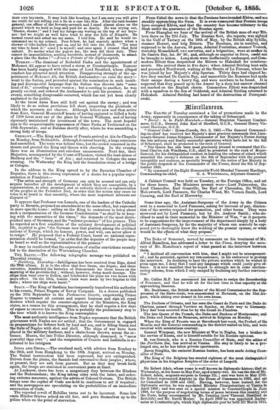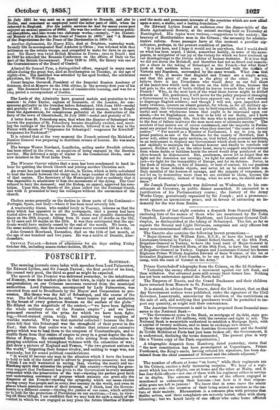311ioulloanuo.
The Gazette of Tuesday contained a list of promotions made in the Army, apparently in consequence of the taking of -Sebastopol.
" Brevet : to be Field-Afarehale.—General Stapleton Viscount Comber: mere, G.C.B., General John Earl of Strafford, G.C.B., General Henry Vis- count Hardinge, G.C.B.
"General Order : Horse-Guards, Oct. 2, 1855.—The General Command- ing-in-chief has received her Majesty's most gracious commands that-Lieu- tenant-General James Simpson, Commander of her Majesty's Forces during the late arduous and finally successful operations which have led to the fa of Sebastopol, shall be promoted to the rank of General. "The Queen has also been most graciously pleased to command that Co- lonel Charles Ash Windham, C.B., shall be promoted to the rank of Major- General, for his distinguished conduct in heading the column of attack which assaulted the enemy's defences on the 8th of September with the greatest intrepidity and coolness, as specially brought to the notice of her Majesty in the public despatch of the Commander of the Forces, dated the 9th of _Sep- tember 1855.
"By command of the Right HonourableField-Vairshal Viscount Ifardinge, Commanding-in-chief, G. A. Wa-runnerh, Adjutant-General."
A Cabinet Council was held on Tuesday, at the Foreign Office, and sat for three hours. The Ministers present were—Lord Palmerston, the Lord Chancellor, Earl Granville, the Earl of Clarendon, Sir William Molesworth, Lord Panmure Sir Charles Wood, Mr. Vernon Smith, Lord Canning, and the Earl of garrowby.
Some time ago, the Assistant-Surgeons of the Army in the Crimea sent in a memorial to Lord Panmure, asking for increase of pay, diminu- tion of the service required for promotion, and other boons. They were answered not by Lord Panmure, but by Br. Andrew Smith ; who-de- clined to send in their memorial to the Minister of War, "as it purports to be suggestions for the improvement of the department simply by a body of Assistant-Surgeons, by far the majority of whom can scarcely be sup- posed yet to thoroughly know the working of the present system, or what would be the effects of what they propose." •
The Duke of Somerset, moved by comments on his treatment of Mr. Alfred llamilton,bas addressed a letter to the rime*' denying the accu- racy of Mr. Hamilton's report of what passed at the interview between them.
"I declined all conversation with him, that I might not be misrepresent- ed' and he persisted, against my remonstrance, in his endeavour to prolong the interview. In declining to hear the private matters which he wished to press upon me, I deny that I used any language which could justly give of- fence. It is now manifest that he hoped to entangle me in some election- eering- scheme, from which I only escaped by declining any further conversa- tion."
Mr. Collier ItLP. has announced his intention to resign the Recornership of Penzance, and that he will sit for the last time in that capacity at the approaching Sessions.
Mr. Deckhouse, the British member of the Mixed Commission for the Sup- pression of the Slave-trade, was assassinated at Havanah, on the 31st Au- gust, while sitting over dessert in his own house.
The Duchess of Orleans, and her sons the Count de Paris and the Duke de Chartres, passed through Verviers on Sunday, on their way to Germany. They had been escorted thua far by the Count de Flandres.
The late Queen of the French, the Duke-and Duchess of Montpensier, and the Duke and Duchess de Nemours, arrived in Belgium on Monday.
When-the King of Prussia was at Barrebruck last-week, the Prefect of the Moselle and the General commanding in the district waited on him, and were received with ostentatious courtesy.
General Winspear, the new Minister at War in Naples, has a brother in the service of Russia, and is himself notable for his Russian opinions.
M. von Gretsch, who is a Russian Councillor of State, and the editor of '
the Northern Bee has -arrived at Vienna. His stay is likely to lies -pro- longed one, as he has takenprivate apartments.
:Baron Stieglitz, the eminent Russian banker, has been made Acting Coun- cillor of State.
The Xing of the Belgians has created eighteen of the most distinguished ,physiciane in his kingdom Knighthof the order of Leopold.
Sir Robert Adair, whose name is well known in diplomatic history, died on Wednesday, at his house in May Pair, aged ninety-two. Ile was the son of Mr. Robert Adair, sergeant-surgeon to George Ill.; and was born in May 1763. Sir Robert represented Appleby in the House of Commons in 1802, and set for Camelford in 1806 and 1507. Having, however, been trained for the diplomatic service, he was appointed Minister Plenipotentiary at Vienna in April 1806; and was sent on a special mission to -Constantinople in June .1N8, for the _purpose of negotiating terms of peace between this country and the Porte, being accompanied by Mr. Canning (now Viscount Stratford de Radcliffe) and Mr. David Morier. In April 1809 he was appointed Ambas- sador at-Constatainople, which high diplomatic post he held till March 1811. In July 1831 he was sent on a special mission to Brussels, and also to Berlin, and remained so employed until the latter part of 1835, when he returned to England. For his public services he had for many years past enjoyed an annual pension of 2000/. lie was the author of numerous politi- cal pamphlets, and also wrote two elaborate works,—namely, "An Histori- cal Memoir of a Mission to the Court of Vienna in 1806," and "A Memoir pf-the Negotiations_for the Peace of the Dardanelles in 1808-'9.
Another diplomatist, Sir Henry Ellis, died at Brighton, yesterday week. in-early life hesecompanied Earl Amherst to China ; was wrecked with that nobleman on the return voyage, and compelled to make for Java in an open boat. Sir Henry was twice British Minister in Persia,; once in Brazil ; and in 1849 he attended the Brussels Conference on the affairs of Italy on the part of the British- Government. From 1830 to 1835, Sir Henry was one of the Commissioners of the Board of Control.
AdmiralEir Samuel Pym, a distinguished officer, engaged in many smart affairs during the great war, tied at Southampton on Tuesday, at the age of eighty-five. His deathbed was attended by:his aged brother, the celebrated physician, Sir William Pym.
Count Sergius Ouvaroff, President of the imperial Russian Academy of Sciences, died at Moscow on the 16th ultimo, in the seventy-first year of his age. The deceased Count was a man of considerable learning, and was for a long period a correspondent of Goethe.
The Lords of the Admiralty have granted medals and gratuities to two seamen : to John Taylor, captain of .forecastle, of the London, for con- spicuous gallantry in the trenches before Sebastopol, 18th June 1865—medal andgratuity of 151.; to Joseph Trewavas, ordinary seaman, lent to Beagle from the Agamemnon, for oonspicuona gallantry at the destruction of the ferry of the town of Ghenitchesk, 3d July 1866—medal and gratuity of 61.
A letter from St. Petersburg says, that when-the disaster of Sebastopol was known the populace of St. Petersburg became dreadfully excited, and, meet- ing the carriage of the Empress in the streets, followed it on its way to the Palace with shouts of "Vengeance for -Sebastopol! vengeance for Kornileff! vengeance for Nachimoff! "
It is related that at the very moment the French entered the Malakoff a Itaasian General was preparing to distribute crosses of honour. He was made prisoner.
The barque Wester Norrland, Lundholm, sailing under Swedish colours, has been seized in the river, on suspicion of being engaged in the Russian service. She delivered a cargo of timber in the Commercial Docks, and is now detained in the West India Dock.
The -Warsaw Courier relates that a man has been condemned to hard la- bour for quitting the Greek Church and joining another Christian sect.
An event has just transpired at Aivolo, in Ticino, which is little calculated to heal the breach between the clergy and a large number of the inhabitants of that canton. The Secretary of the Municipality died so suddenly that it was impossible to administer. to him the sacraments of the dying. The Cure refused to bury the deceased ; and the Bishop, on-appeal, approved his reso- lution. Upon this, the Syndic of the place called out the National Guard, and with it proceeded to bury his colleague without the ceremonies of the church.
Cholera seems generally on the decline in those parts of the Continent— Portugal, Spain, and Italy—where it has been most severely felt.
A trustworthy friend, who resided lately in Tuscany, informs us that the story which has appeared in all the newspapers, that a person had been buried alive at Florence, is 'untrue. The cholera was steadily diminishing there on the 26th August; falling from 31 eases and 17 deaths on the 23d, to 12 eases and 10 deaths on the 25th. It was then anticipated that the epi- demic-would have entirely ceased by the end of the month. We learn, on the same authority, that the number of cases never exceeded 150 in a day.
John Gmssick -Moorhead, Tannadice, died on the 11th of last month, at the age of one hundred and two years. He was a native of Deeside, Aber- deenshire.
CRYSTAL PaLaez.—Return of admissions for six days ending Friday Oetober 6th, including season-tioket-holders, 29,504.



























 Previous page
Previous page